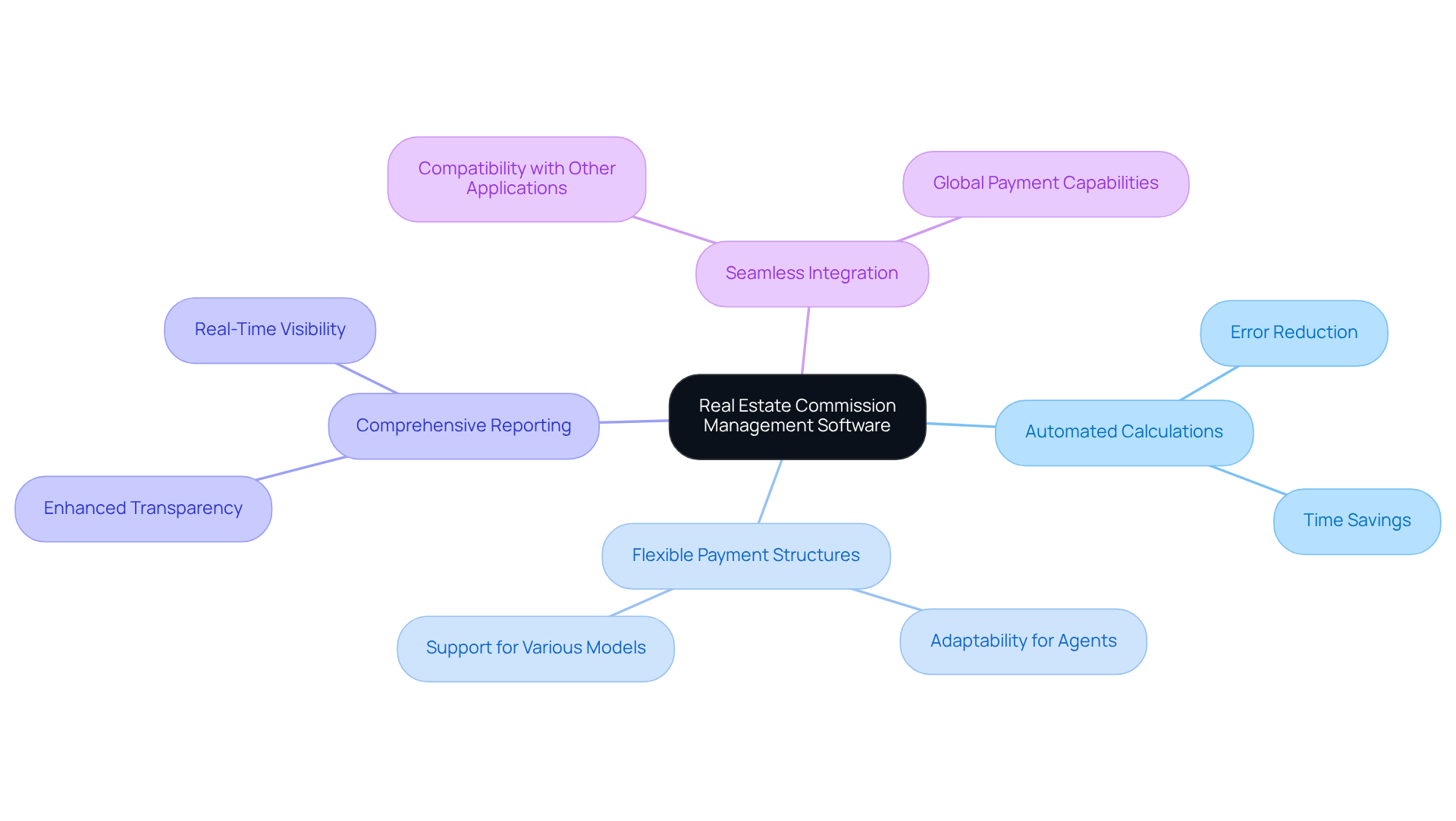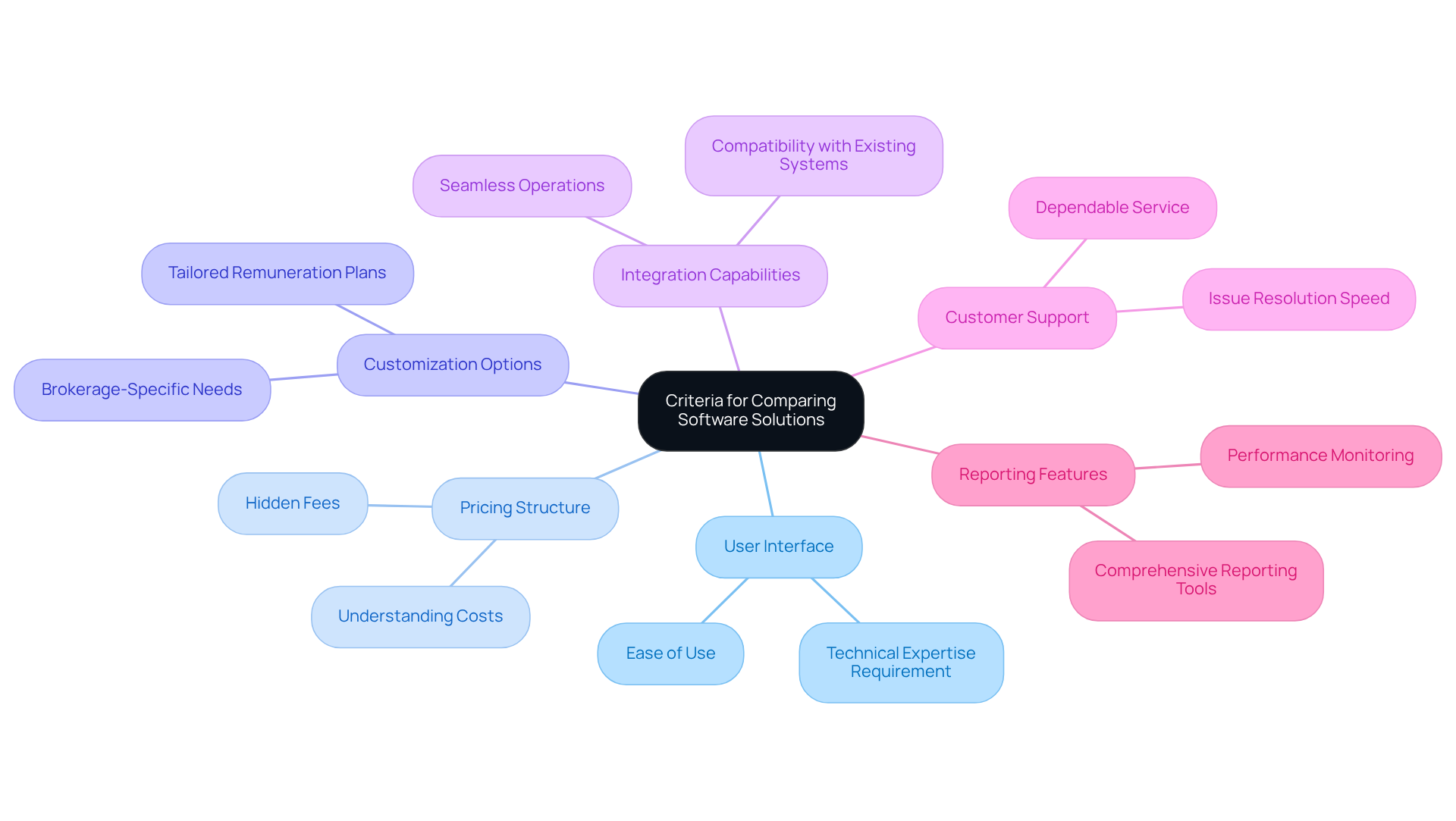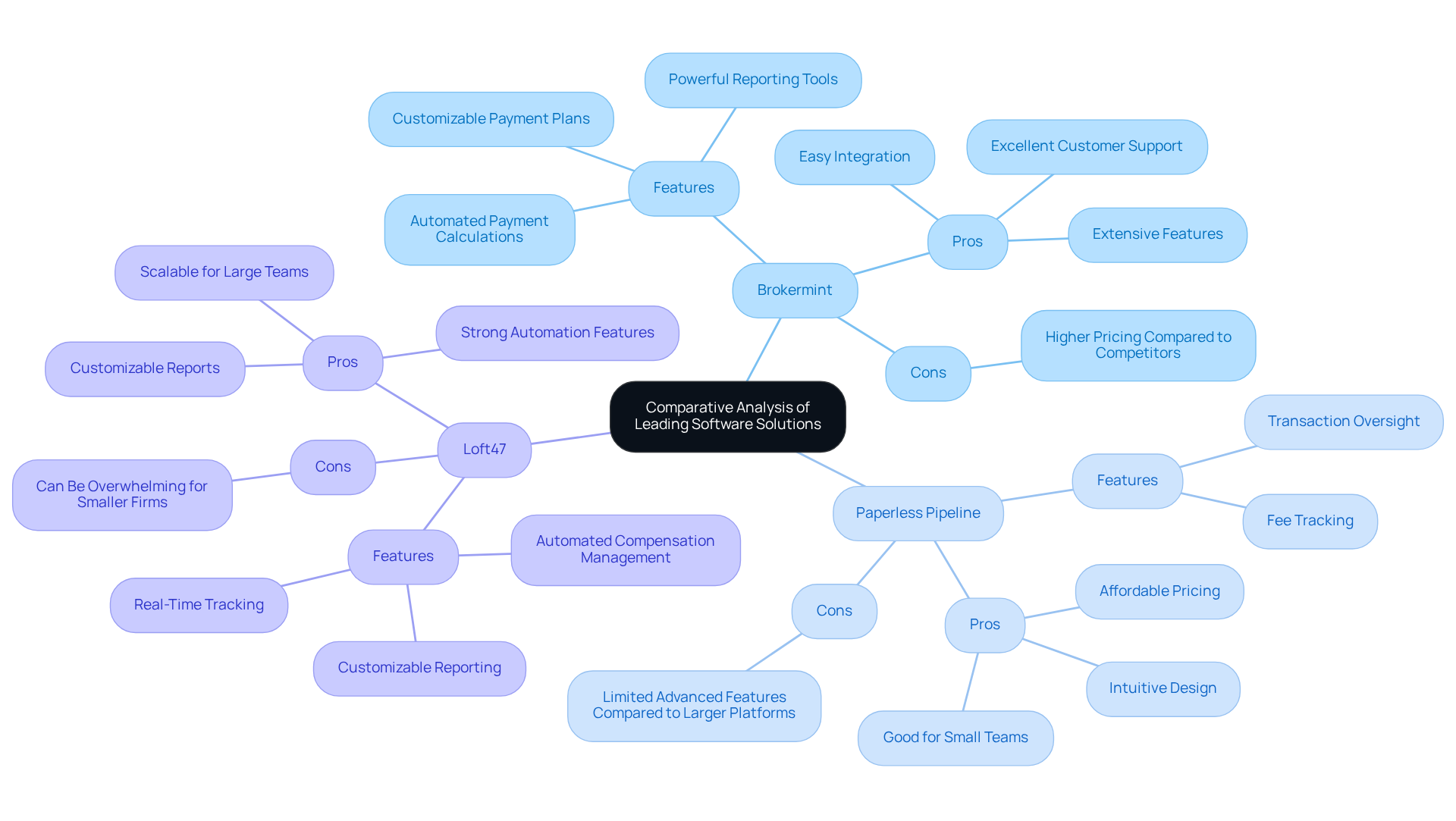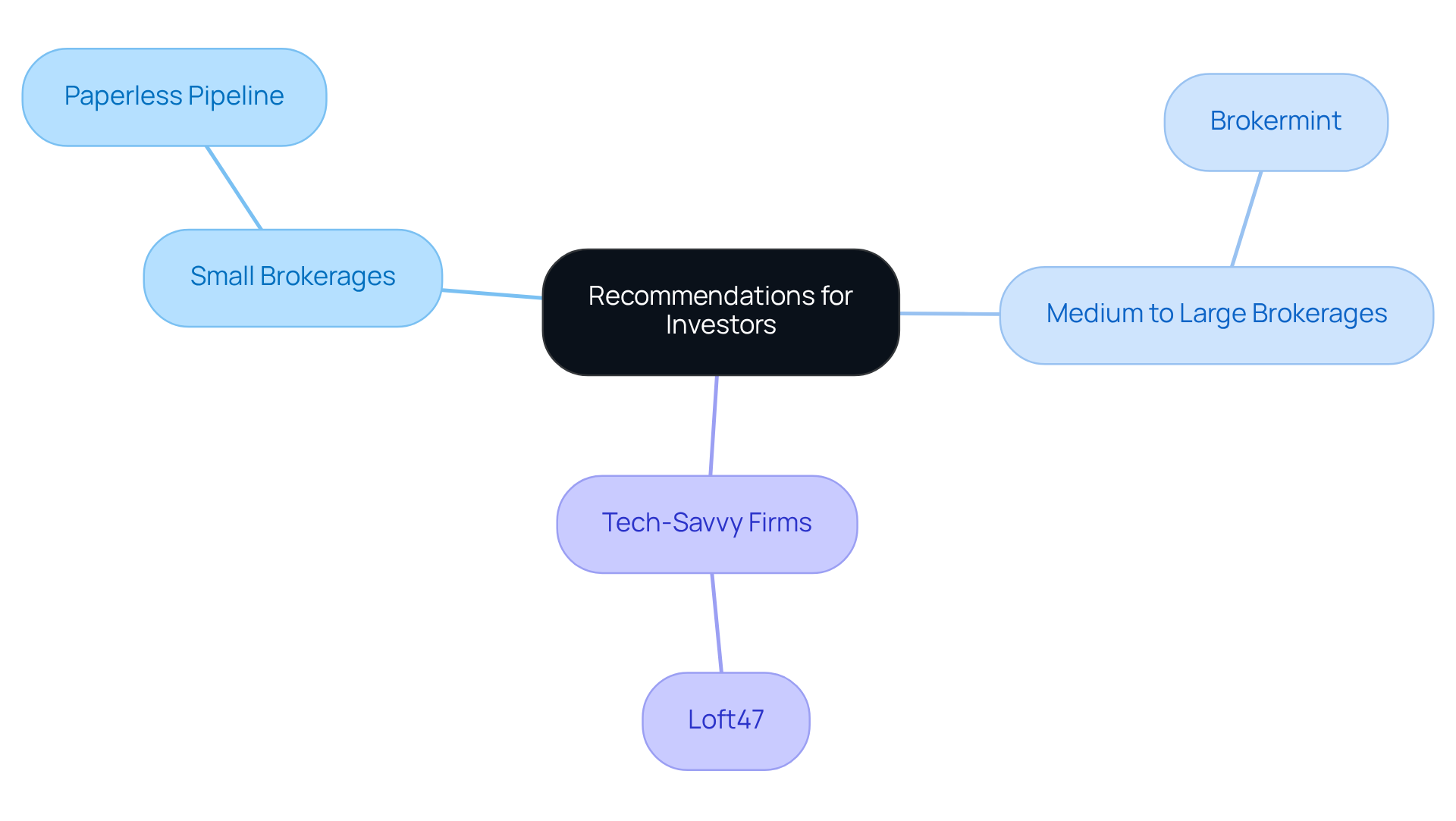Overview
The article presents a comparative analysis of real estate commission management software, underscoring the critical importance of selecting the appropriate tool tailored to the specific needs of various brokerage sizes.
It elaborates on this by detailing essential features and evaluation criteria, alongside targeted recommendations for small, medium, and tech-savvy firms.
Each software solution is examined for its ability to address diverse operational requirements, ultimately enhancing efficiency.
This analysis not only informs readers of the available options but also empowers them to make strategic decisions that align with their unique business demands.
Introduction
The landscape of real estate commission management is evolving rapidly, driven by the need for efficiency and accuracy in payment processing. As firms navigate complex compensation structures, the right software can be a game-changer. It offers not just streamlined calculations but also enhanced transparency and compliance.
However, with numerous options available, how can one determine which solution best meets their unique needs? This article delves into a comparative analysis of leading real estate commission management software. It explores essential features, benefits, and tailored recommendations for various brokerage sizes, ultimately guiding firms toward informed decisions that foster growth and operational excellence.
Understanding Real Estate Commission Management Software
Real estate commission management software is vital in automating and streamlining the processes of calculating, tracking, and distributing payments for agents and brokers. These sophisticated tools are essential for managing complex payment arrangements, ensuring both accuracy and compliance with industry regulations. For instance, real estate team fees at small agencies typically follow a 50/50 split to cover administrative support. Key features generally include:
- Automated calculations
- Flexible payment structures
- Comprehensive reporting functionalities
- Seamless integration with other real estate applications, such as automated payment processing and global payment capabilities
As Rachel Peterson, a technology consultant, asserts, "Real Estate Commission Tracking Program is an essential resource for contemporary real estate experts and firms." By significantly reducing manual errors and alleviating administrative burdens, real estate commission management software enhances operational efficiency and transparency within real estate firms. Furthermore, effective compensation oversight can lead to improved clarity and increased motivation among sales teams.
However, it is crucial to recognize that while flat fees may benefit seasoned agents with established networks, they can present challenges for newcomers. Therefore, real estate commission management software and other technological solutions have become indispensable for modern trading operations, enabling firms to focus on growth and client service.

Criteria for Comparing Software Solutions
When evaluating real estate commission management software, several key criteria warrant consideration:
- User Interface: A user-friendly interface is paramount for ensuring ease of use, particularly for agents who may lack technical expertise.
- Pricing Structure: A thorough understanding of costs, including any hidden fees, is essential for effective budgeting.
- Customization Options: The capacity to tailor remuneration plans to meet specific brokerage needs significantly enhances functionality.
- Integration Capabilities: Ensuring compatibility with existing systems, such as CRMs and transaction processing tools, is crucial for seamless operations.
- Customer Support: Dependable customer service can greatly impact the speed and efficiency with which issues are resolved.
- Reporting Features: Comprehensive reporting tools are vital for monitoring performance and analyzing trend data, thereby supporting strategic decision-making.

Comparative Analysis of Leading Software Solutions
In this comparative analysis, we examine three leading real estate commission management software solutions:
-
Brokermint is recognized for its extensive features as a leading real estate commission management software, excelling in providing automated payment calculations, customizable payment plans, and powerful reporting tools. Its user-friendly interface and robust customer support solidify its position as a popular choice among firms.
- Pros: Extensive features, excellent customer support, easy integration.
- Cons: Higher pricing compared to competitors.
-
This real estate commission management software, Paperless Pipeline, stands out in transaction oversight and fee tracking. With a straightforward interface, it is particularly advantageous for smaller firms seeking an all-in-one solution.
- Pros: Affordable pricing, intuitive design, good for small teams.
- Cons: Limited advanced features compared to larger platforms.
-
Loft47 emphasizes automating compensation management processes by using real estate commission management software, which offers real-time tracking and customizable reporting. It is ideally suited for larger firms with intricate compensation systems.
- Pros: Strong automation features, customizable reports, scalable for large teams.
- Cons: Can be overwhelming for smaller firms due to its complexity.

Recommendations for Investors Based on Software Comparison
Based on the comparative analysis, tailored recommendations for various types of investors are presented below:
- For Small Brokerages: Consider Paperless Pipeline for its affordability and ease of use. This solution provides essential features without overwhelming complexity, making it ideal for smaller teams.
- For Medium to Large Brokerages: Brokermint is recommended due to its comprehensive features and strong customer support. This real estate commission management software is effective at managing larger teams and more complex commission structures.
- For Tech-Savvy Firms: Loft47 is suitable for those seeking advanced automation and customization options. Its robust reporting capabilities offer valuable insights for strategic planning.
Ultimately, the choice of real estate commission management software should align with the specific operational needs and growth objectives of the brokerage. This alignment ensures that the selected solution enhances efficiency and supports business success.

Conclusion
Real estate commission management software is essential for enhancing operational efficiency in the industry, automating payment processes, and ensuring compliance. These tools not only simplify the complex landscape of compensation but also empower real estate firms to concentrate on growth and client satisfaction. By leveraging these sophisticated solutions, agencies can significantly reduce manual errors and streamline their workflows, ultimately leading to improved productivity and transparency.
This article explores crucial criteria for evaluating various software options, including:
- User interface
- Pricing structure
- Customization capabilities
- Integration with existing systems
- Customer support
- Reporting features
A comparative analysis of leading software solutions—Brokermint, Paperless Pipeline, and Loft47—highlights their unique strengths and weaknesses, guiding firms in selecting the right tool for their specific needs. Each recommendation is tailored to different brokerage sizes and technological preferences, ensuring that the chosen software aligns with operational goals.
In a rapidly evolving real estate landscape, investing in the right commission management software is vital for maintaining a competitive edge. Firms should carefully assess their specific requirements and growth ambitions when making a decision, as the right software can enhance efficiency and drive business success. Embracing these technological advancements not only streamlines operations but also fosters a motivated sales force, ultimately contributing to the overall success of the brokerage.




